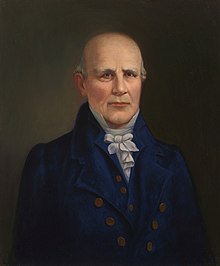Nathaniel Macon
Nathaniel Macon (born December 17, 1757 in Warrenton , Province of North Carolina , † June 29, 1837 in Warren County , North Carolina ) was an American politician and spokesman for the Republican politicians within the then Democratic Republican Party , which was in power the government wanted to restrict.
Early years
Macon was born near Warrenton, North Carolina and went to college in New Jersey . In the Revolutionary War he served only briefly. His political career began with membership in the North Carolina Senate in 1781, 1782, and 1784; he declined the appointment as a delegate to the Continental Congress . From 1791 to 1815 he was a member of the US House of Representatives , whose speaker he was from 1801 to 1807. He served in the Senate from December 1815 until his resignation in 1828. He was also President of the North Carolina Constitutional Convention in 1835 .
Politician
He rejected the constitution and devoted his four decades in the United States Congress to weakening the government. He particularly hated Alexander Hamilton and his federal program . He bitterly opposed the Jay Treaty in 1795, the Alien and Sedition Acts of 1798, and the Movement for War with France in 1798-99. He welcomed Thomas Jefferson's purchase of Louisiana in 1803 and tried to persuade him to buy Florida as well. From 1801 to 1817 he supported all foreign policy projects of Jefferson and James Madison . In 1809, he chaired the predecessor of the United States Senate Committee on Foreign Relations , the committee dealing with United States foreign policy legislation , and announced two notices that bore his name, although he had neither written, and definitely refused the second. In the years 1818-1819, 1825-1826 and 1827-1828 he was also chairman of this committee.
The first notice attacked British shipping but was denied. In May 1810, the second notice was adopted, giving the President permission to cease trading with Britain or France if either should interfere in American trade with the other. Macon supported Madison when Madison declared the British-American War in 1812 ; however, he refused conscription in order to build an army, as did higher taxes. He refused to re-establish the United States Bank in 1811 and 1816 , and he also voted against any form of protective tariffs. He supported some of the government's plans to build roads, but was opposed to any kind of proposal put forward by Henry Clay and John C. Calhoun . During the Missouri debate in 1820, he voted against Henry Clay's compromise proposals. He was also a staunch defender of slavery .
For 37 years, Macon was the most prominent no-sayer in Congress. It was said of him that during his tenure, hardly anyone else voted against it with as many votes. “Rejection was his one and only”. He was of a rural nature and was localized. Profitability was the passion of his career. His economy of public money was the most thorough and strict, and was reflected in the constant rejection of almost all proposals that could be made.
death
Macon died on June 29, 1837 in Warren County , North Carolina , where he was also buried in a private cemetery.
Macon County in Alabama, Macon County in Georgia, Macon County in Illinois, Macon County in Missouri, Macon County in North Carolina and Macon County in Tennessee are named in his honor. In addition, the cities of Macon in Georgia and Macon in North Carolina also bear his name, just as Randolph-Macon College in Ashland , Virginia was named after him. He was also the uncle of Congressman Micajah Thomas Hawkins and the great-grandfather of Charles Martin , who was also a Congressman.
literature
- William E. Dodd: The Place of Nathaniel Macon in Southern History . American Historical Review, Vol. 7, No. 4 (July 1902), pp. 663-675 online at JSTOR
- JG de Roulhac Hamilton: Macon, Nathaniel . In: Dictionary of American Biography, Volume 6 (1933)
Web links
- Nathaniel Macon in the Biographical Directory of the United States Congress (English)
| personal data | |
|---|---|
| SURNAME | Macon, Nathaniel |
| BRIEF DESCRIPTION | American politician |
| DATE OF BIRTH | December 17, 1757 |
| PLACE OF BIRTH | Warrenton , Province of North Carolina |
| DATE OF DEATH | June 29, 1837 |
| Place of death | Warren County , North Carolina |




